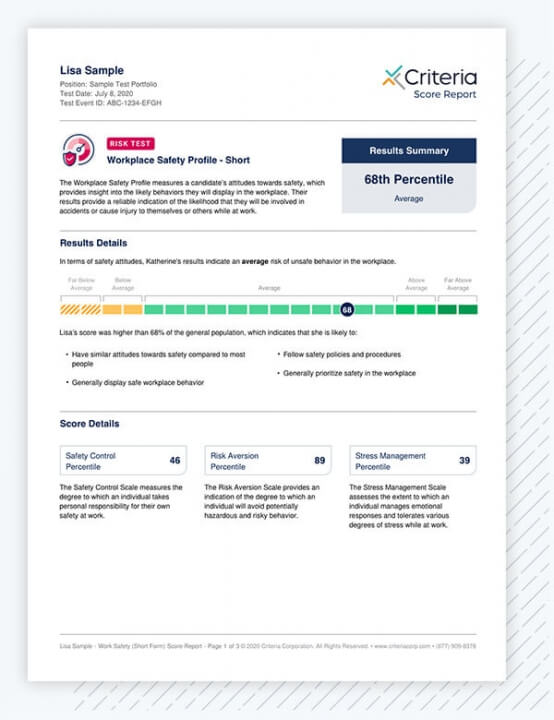Workplace Safety Profile (WSP)
Measures:
- Safety attitudes
- Risk-taking behaviors
- Likelihood of causing accident or injury
Recommended for:
- Manufacturing
- Construction and Mining
- Oil and Gas
- Driving and Transportation/Logistics

Test Description
The Workplace Safety Profile (WSP) is a risk assessment that measures a candidate’s attitudes towards safety. The results provide a reliable indication of the likelihood that an individual will be involved in accidents or cause injury to themselves or others at work. The WSP can help organizations reduce the occurrence of workplace incidents and is primarily used for roles where safety behavior is an important factor.
Research shows that 80% of workplace incidents are caused by human error. This assessment allows you to identify employees or candidates who are more likely to engage in risky behavior. By reducing the risk of human error, you can significantly improve productivity and reduce costs.
Score Reports
Each candidate is given a percentile ranking and an Overall Rating of High, Medium, or Low, based on the risk that the candidate may engage in unsafe behavior in the workplace. The score reports also provide scores for three sub scores, including, safety control, risk aversion, and stress management.
Promote a Strong Safety Culture
The WSP predicts the likelihood that someone will engage in risk-taking behavior or condone that behavior in others. By using the WSP to hire, organizations can contribute positively to their safety culture, helping to ensure that employees will avoid taking actions that may harm themselves or others. It also increases the likelihood that employees will speak up if an unsafe action is occurring. The result is a workplace where employees can feel safe and productive.
Validity Information
The WSP has been extensively validated, demonstrating that the test is highly predictive of job performance for a wide variety of jobs. Validation studies have demonstrated that the WSP is strongly related to safety outcomes including serious injuries, minor injuries, and accidents at work.
A long-form version that measures two additional factors is available on request.